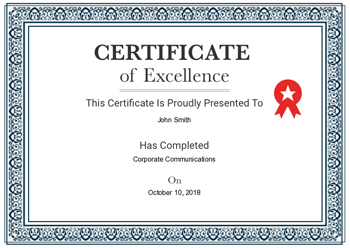Hail the certificate!
An indigenous medicine for COVID-19!A person not much talked about declared that he invented a concoction that would respond to COVID-19. He displayed his newly found preparation but failed to display a certificate. This created an uproar in the country for several weeks. I would leave the discovery of the effect and authenticity of his product to the researchers and authorities. But, this reminds us of the ‘value of a certificate’.

Ms. Chani Imbulgoda
What would you rely on… certificate or knowledge? None of the greatest intellectuals of all time had certificates to prove their competencies. But, they invented; they discovered new knowledge. The world accepted them sooner or later, and we reap benefits. Someone has said that we would’ve still been in the dark if Thomas Alva Edison’s light bulb was rejected due to non-possession of a certificate. Great inventions emerge from mindset, not through a piece of paper obtained by proving ones’ genuine or fake competencies.
I was listening to a recent discussion with a founder-owner of a private education institution. He said, a degree which state university students acquire in 42 months, can be acquired by a student who completes ordinary level education and registered at his institute in just 18 months. True at the end, both students get a ‘degree certificate’; the pass to enter the world of work. So simple, and some would be taken up by such promotional campaigns. But, will this student who completes a fast phase education carry the same breadth and depth of knowledge as the one who sacrifices a full six years of learning in a hard way? Would this student’s cognitive capacity be enhanced like the other who get exposure and experience over six years of learning in the school and the university? However, the cognitive capacity of the students of state universities is also being questioned.
Degrees
The aim of students going to universities nowadays is to pass exams and get the degree certificate, rather than attending lectures while engaging in university life. Some state universities have also become degree mills that produce graduates with the same block and at the end of the course produce a certificate to go grab a job. And then…some graduates wait with the certificate until the benevolent government calls them and offer jobs under a graduate training scheme to go and perform mediocre jobs. “My qualification looks nice on my CV. But I am yet to use what I learnt…I learnt my textbooks by heart, I got a friend to write my assignment and paid to get my dissertation written”. These words in an advertisement on a Sunday newspaper, published by an education institute caught my eye first and then the mind. True … if you go through the newspapers, you would find ‘certificate mills’, and individuals who promote the business of writing reports and dissertations for others. The question whirls around us… is it right to depend on certificates to assess ones’ competencies?
What is this certificate?
According to the US National Council on Measurement in Education, “a certificate is a document produced after testing whether individuals are knowledgeable enough in a given occupational area to be labelled ‘competent to practice’ in that area”. The Cambridge Dictionary offers a general definition to certificate, i.e. “an official document that states the information on it is true and that is given to someone as proof that they are, have, or own something, or have permission to do something”.
Why certificate?
Certificates play several significant roles in our lives. We come to this world with a certificate; ‘certificate that pleasantly declares a person with a name and a pedigree that is going to exist henceforth’. Yet, if the newborn is not a product of a certificate – ‘marriage certificate’, the newborn might remain non-existent without a certificate. Recently, news flashed about the famous Lebanese girl, Maha Mamo who lived 30 years without an identity, she finally got the certificate of existence from Brazil suffering difficulties with long haunting memories in life and a persistent struggle. Certificates! A determining factor of life in a civilized world (‘they say’). Humans like Maha Mamo exist but couldn’t enter a school, couldn’t take treatment for the illness, couldn’t buy a phone SIM without a certificate. They had to struggle eternally, while lucky ones’ like Maha Mamo finally win; millions suffer without a certificate to prove the mere fact that they are human beings and have a right to enjoy what other humans enjoy.
 The luckier ones claim birth certificates and thereupon struggle to collect certificates to declare proudly their achievements, from the kindergarten level. Collection of various certificates to get admission to schools, to display that they excel in studies, aesthetics, sports and what not to declare their quality to the world. Apparently, our generation struggles from womb to tomb to get certificates. Finally, we leave the world with a certificate that announces, ‘there was a person who existed in this place and exited due to this cause’. Now, we struggle hard to get that certificate without ‘the cause of death being ‘COVID 19’. The role of the certificate of the person does not end with the demise. It is preached that ‘death is the end of life’. But, not for the certificate! To have the funeral done, thereafter, to enjoy the dead person’s affluence, to claim rights, the kith and kin use the death certificate and every other certificate… Now, we know how precious is this piece of paper with a little ink and someone’s authentic or inauthentic signature on it.
The luckier ones claim birth certificates and thereupon struggle to collect certificates to declare proudly their achievements, from the kindergarten level. Collection of various certificates to get admission to schools, to display that they excel in studies, aesthetics, sports and what not to declare their quality to the world. Apparently, our generation struggles from womb to tomb to get certificates. Finally, we leave the world with a certificate that announces, ‘there was a person who existed in this place and exited due to this cause’. Now, we struggle hard to get that certificate without ‘the cause of death being ‘COVID 19’. The role of the certificate of the person does not end with the demise. It is preached that ‘death is the end of life’. But, not for the certificate! To have the funeral done, thereafter, to enjoy the dead person’s affluence, to claim rights, the kith and kin use the death certificate and every other certificate… Now, we know how precious is this piece of paper with a little ink and someone’s authentic or inauthentic signature on it.
Real danger?
In general, we depend and over depend on certificates. Over-dependence on certificates brings inequity. One is on the very right for the existence of human beings. Another is suppressing people who are competent but lack qualifications certified on a paper. The bureaucracy spread worldwide looks for ready-made evidence but ignores to pay attention to understand the requirements for certification. Examples are Maha’s case in Lebanon and the case of indigenous medicine for COVID-19 in Sri Lanka. A culture of certificate collection is setting in. Some of my colleagues, go for training more than they come to work. Some institutes organise research conferences several times a year, and, some present papers at every conference leaving us to wonder whether they only do research 24 hours/365 days and nothing else. The intent is accumulating certificates, which would come handy for their next promotion. When people work towards targets, exams, their cognitive processes become weak. They work in a rush towards the target in a bounded frame. The knowledge expansion is restricted and easy ways of getting certified are promoted. Collection of certificates through bribes or shallow work leads to deterioration of quality of mankind. Trillions of papers bearing the title ‘certificate’ are discarded every year. Trillions of papers bearing the same title are piled in heaps every year. Trillions of trees are sacrificed to produce such papers leaving trillions of living beings out of breath sooner than we ever guess. The danger of the rat race for certificates slips from everyone’s mind without consciousness.
Way out
It is too late but better being late than never to think of a way out, a way forward, and way back to straighten and rectify the omissions that have occurred. Yes, the easiest and most discussed, but hardly implemented recommendation is digital certification. No one will say a big ‘NO’, but lethargy and ideologies stand against us when putting it in practice. Where do we really need certifications? This should come first. Say no to unnecessary certification, say no to unnecessary certificates needed to get the essential certification. For human aspects like certificates of existence, we have to think out of the same old boxes and bring in humanity and authenticity. A solution to the rat race towards getting certificates. A way out? All above plus. Bring morality into human lives. Before seeking a certificate, we have to ask ourselves, “am I or my service or product really competent to do what I claim for with the certificate?” Bring morality into institutions. Before requesting to produce certificates, ask “whether the bearer is eligible to award with the certification of competency, whether the service or product would deliver what it claims as possible?”
A rather simple, but very complicated decision would make a change; i.e. determine whether we embrace ‘the certificate’ or ‘the knowledge’.
(The writer is a holder of a senior position in a state university with international experience and exposure and an MBA from Postgraduate Institute of Management (PIM), Sri Lanka and currently reading for her PhD in Quality Assurance in the Higher Education Sector at PIM. She can be reached at cv5imbulgoda@gmail.com).


